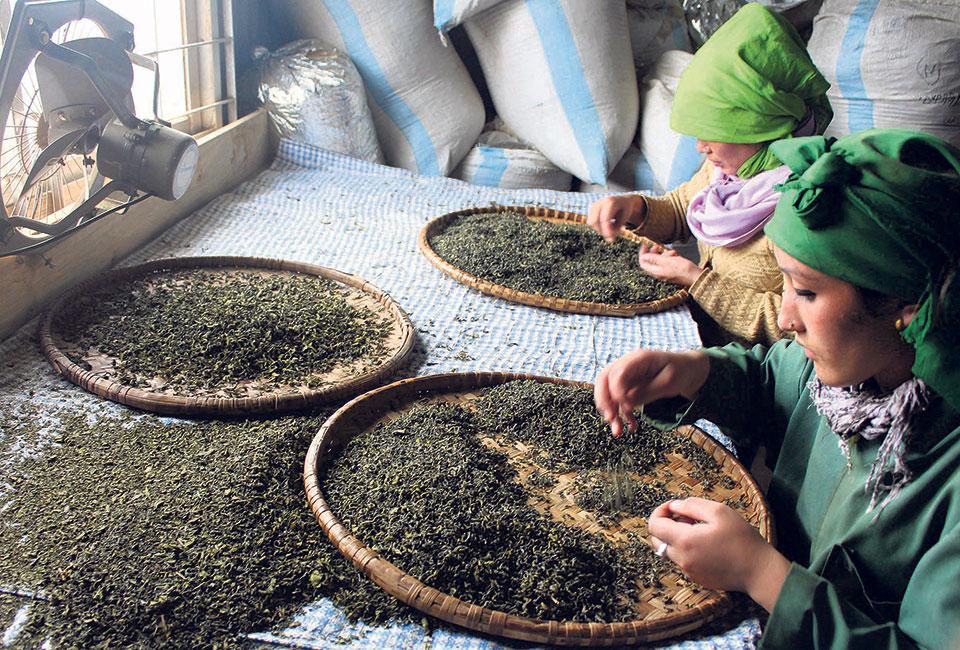
OR
Foreign buyers looking for variety in Nepali tea
Published On: November 25, 2018 10:07 AM NPT By: Bhim Chapagain

ILAM, Nov 25: Foreign consumers of Nepali tea, who used to be interested in buying any type of organic tea from Nepal, have started looking for diversity in products, according to tea entrepreneurs.
With the changing demand, Nepali tea producers have started supplying a variety of tea in the international market, such as green, black, white, and golden tea.
For buyers from Germany, China, Russia, the US, and the Netherlands, white, green, and golden tea are more popular, according to tea traders. Previously, tea being organic was enough for most buyers.
As the production of white tea is low, buyers often have to be content with green and golden tea leaves from Nepal, according to traders.
Traders from third countries (besides India) prefer orthodox tea. Every year, Nepal produces around 10 million kilograms of orthodox tea. Around 300,000 kilograms of tea is organic tea, according to tea entrepreneur Sharad Subba.
“Few years back buyers did not go after flavor, they just needed organic tea,” he said. “But these days they look for quality as well as flavor of the tea.”
Golden, green, white, green pearl and golden pearl are some of the flavors of Nepali tea, he added. Organic tea is produced especially in Ilam, Panchthar and Dhankuta districts in the eastern Nepal.
In comparison with black tea, white tea and green pearl tea are much expensive.
Nepal has been exporting tea to USA, UK, Japan, Czech Republic, Slovakia, France, and other countries as well. Currently, 28 kinds of orthodox tea are being produced in Nepal.
Gorkha Tea State of Suryodaya Municipality, Himalayan Shangri-la Tea Producers Pvt Ltd, Green and Specialty Pvt Ltd of Pashupatinagar, and tea industries of Maipokhari and Chamaita are the major producer of orthodox tea in Nepal. There are around two dozen tea processing factories in Kanyam, Ilam Municipality, Shree Antu, Phikkal, Panchakanya, and Soktim areas.
Chiran Dahal, a tea entrepreneur based in Kathmandu, said: “Tea is like an art for foreign traders. They have plenty of knowledge regarding flavors of tea and the way of consuming it.”
Demand of Nepali tea is increasing every year in the global market. Orthodox tea not only tastes good, but is also beneficial for health and environment as well, according to farmers and experts.
There are 131 tea industries in 14 districts of the country. According to statistics prepared by Central Bureau of Statistics, and Nepal Tea and Coffee Development Board, these industries produce around 19 million kilograms of tea annually. Only about 11 percent of the total production is organic tea. Around 30 percent of tea gardens in these districts are in the process of getting organic certification.
You May Like This

Research into developing Nepali brand tea started
DHANKUTA, Feb 26: The National Agricultural Research Centre (NARC) has started research on production of Nepali variety of tea. ... Read More...

Consumer's health widely neglected
JHAPA, Feb 7: Despite being ware about the fact that vegetables imported from India have high level of pesticide residue, the... Read More...

India 228-1 at tea on day 3, replying to England's 537
RAJKOT, India, Nov 11: Cheteshwar Pujara was one short of his century and Murali Vijay was 86 not out as India... Read More...

Just In
- World Malaria Day: Foreign returnees more susceptible to the vector-borne disease
- MoEST seeks EC’s help in identifying teachers linked to political parties
- 70 community and national forests affected by fire in Parbat till Wednesday
- NEPSE loses 3.24 points, while daily turnover inclines to Rs 2.36 billion
- Pak Embassy awards scholarships to 180 Nepali students
- President Paudel approves mobilization of army personnel for by-elections security
- Bhajang and Ilam by-elections: 69 polling stations classified as ‘highly sensitive’
- Karnali CM Kandel secures vote of confidence


















Leave A Comment